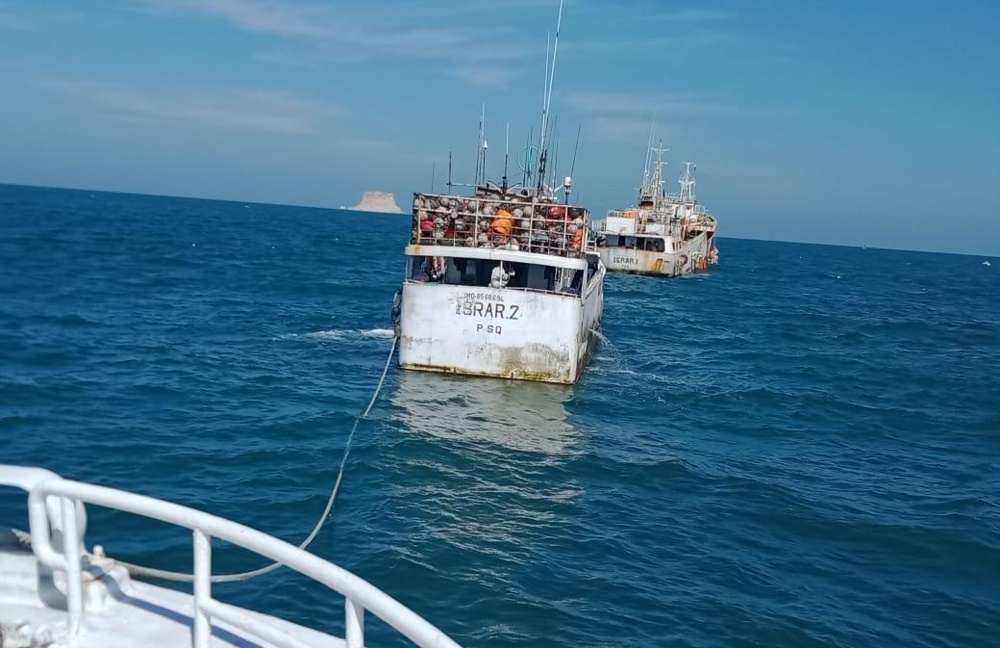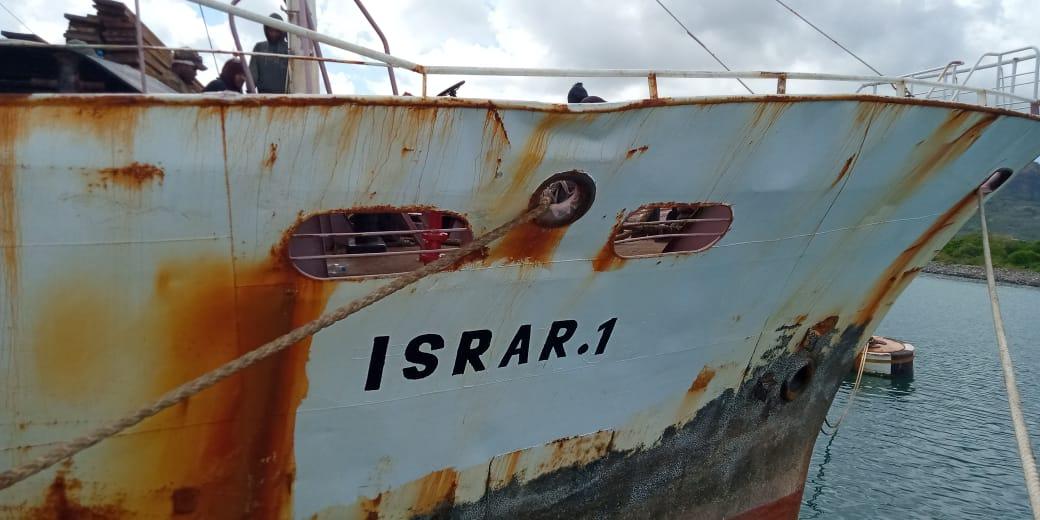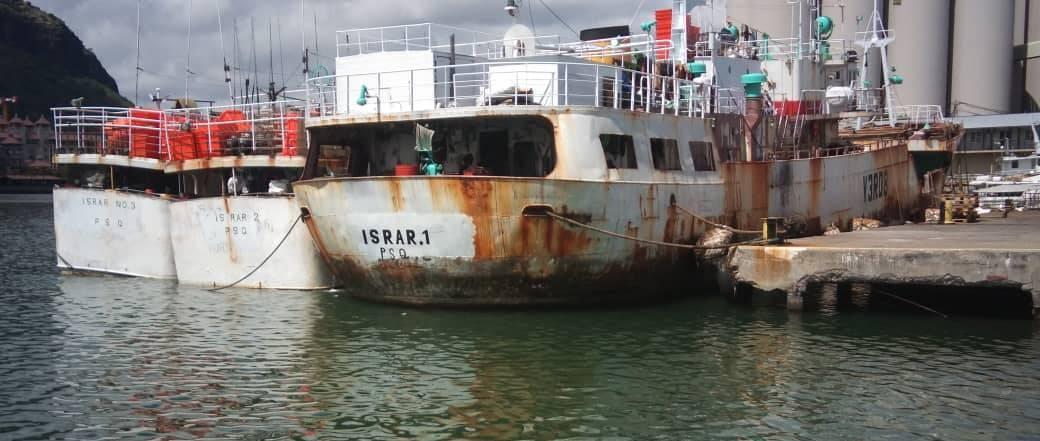
Illegal Fishing Is Pushing Ocean Ecosystems Toward Collapse
As fishing vessels scour the oceans for fewer and fewer fish, the trail of each one can be tracked via satellite. Each ship crosses and recrosses the paths left by others until the seas of the world start to resemble the fishing nets they play host to. Within this tangled web, the paths of two vessels caught the attention of the investigative team at my organization, the Environmental Justice Foundation — their strange, parallel movements didn’t look right.
This chance observation, unremarkable to most, was the start of a year-long investigation to expose the Israr fleet — three vessels illegally fishing for tuna, damaging our already over-exploited ocean ecosystems, threatening the food security and livelihoods of coastal communities, and using every means possible to evade detection. These vessels, and others like them, fish illegally and often indiscriminately, outcompeting local fishers and putting at risk the food security and livelihoods of over 100 million people who rely on small-scale fishing.
The operator controlling this fleet knew how to work the system. They knew the chronic lack of transparency, communication and accountability across the global fishing sector could be used to their advantage to keep the fleet’s illegal and destructive activities off the radar.
They are by no means the first to notice and exploit this weakness — the systemic lack of transparency across global fisheries is one of the most significant enablers of illegal fishing around the world. Crucial information on vessel ownership, records of illegal activity and fishing authorization are not publicly available, forcing authorities to make uninformed decisions on which vessels are allowed to fish their waters. The lack of data flow hinders collaboration between NGOs, governments and regional fishing authorities working to apprehend illicit operators and makes it far too easy for illegal fishing to thrive. It also creates a lawless environment ripe for human rights abuses to flourish, with no oversight and no escape.
There is a proverbial playbook of tried-and-tested tactics that exploit the flaws in the system. The owner of the Israr fleet knew them all.
Practiced Deception
All fishing vessels are required to sail under the flag of a nation, and, in theory, abide by the laws of that state. The Israr fleet not only went “stateless” for a time, illegally sailing under no flag, the sailors repeatedly changed their flags. Swapping flags may not be illegal, but it is used by illegal operators to create confusion around who is responsible for monitoring and sanctioning the vessel, or to adopt a flag of a state they know simply can’t or won’t monitor their operations and enforce laws and regulations. Under cover of this uncertainty, they can continue their criminal activity uninterrupted, damaging our oceans and decimating fish populations.
To add to this confusion, the owners changed the names of the vessels, with crew switching digital ID codes mid-voyage and physically painting over the name on the side of each vessel with bright white paint. This tactic is only effective because of our disjointed system. Universal vessel identification systems do not apply to all fishing vessels, not all nations have national vessels identification schemes for non-eligible vessels, and many of these registries are not publicly available to check vessels committing illegal acts against. There is currently no truly universal, openly available system of vessel identification — a unique number or code, a so-called unique vessel identifier (UVI) — that stays with each vessel from shipyard to scrapyard, regardless of name or flag changes. Without such records, it is almost impossible to uncover the illegal history of a vessel, and to hold the owners and operators accountable.
The Israr fleet also engaged in trans-shipment, meeting other vessels at sea to transfer catch, supplies or crew. While this can occur legally, it has become a characteristic tactic of illegal operators trying to cover their tracks. It allows them to “launder” fish caught illegally and perpetuate the abuse and enslavement of crew by enabling vessels to stay away from port for months or even years.
For example, migrant workers in Korea’s distant water fishing fleet reported being forced to work 18-hour days; a quarter of the crew we spoke to had experienced physical abuse and over 60 percent had witnessed verbal abuse. Almost all had their passports confiscated by their captain and several months’ wages deducted at the start of contracts to discourage them from escaping these abusive environments. These vessels regularly remained at sea for over a year, and in some cases over 18 months, without calling at port.
A Lucky Observation
It took over a year of investigation to build a case against the Israr fleet, but it paid off. In December 2021, the fleet was blacklisted by the International Commission for the Conservation of Atlantic Tunas, a significant blow to this illicit network. If properly implemented, this will prevent the fleet from selling any of the fish they catch.
We cheered this small victory the Environmental Justice Foundation — one less fleet abusing the system and damaging our oceans. But what about the next vessel, and the one after that?
The Israr fleet was caught by chance by an observant, determined NGO. Up against global illegal fishing operations catching 26 million tonnes of fish each year, this approach will barely scratch the surface. We cannot afford to continue in this hit-or-miss manner.
Systemic Change
We need a system that works for us, not for them — a system built on transparency. By opening data flow between nations and bringing vessel license lists, history of offenses and full ownership details into the public realm, we can start to protect our ocean from these damaging fleets and hold the owners of these vessels accountable.
This systemic change is needed on an international level. In the Israr investigation alone, we worked with fishing authorities in Belize, Saint Vincent and the Grenadines, Brazil, Senegal, Trinidad and Tobago, the U.S., France and Oman, all tuna regional fisheries management organizations, the European Commission, INTERPOL and crew members in Mauritius. This is the level of international data-sharing and collaboration we need to achieve.
This may sound daunting, but bringing fisheries out of the shadows does not require new, sophisticated technology, or unrealistic expense. It can be achieved by any country through a combination of public data-sharing, enforcement of sustainable fisheries laws, and the use of existing technology to understand, map and disclose supply chains.
If we fail to enact this change, millions of people will suffer, especially coastal communities that rely on thriving fisheries to survive. We are already seeing the consequences of apathy in Ghana, where the fundamental human rights of Ghanaian fishing communities are being threatened by the government’s failure to tackle overfishing and illegal fishing by industrial trawlers. Over half the 215 small-scale fishers, processors and traders we spoke to reported going without sufficient food over the past year, and over 70 percent reported a deterioration in their living conditions over the past five years. The vast majority of industrial trawlers in Ghana, although operating under the Ghanaian flag, are controlled and financed by distant water fishing companies based in China.
Illegal fishing is pushing ocean ecosystems toward total collapse and stripping millions of people of their food security and livelihoods. It is cause for international shame that the chronic lack of transparency can still be used get away with these crimes. Only through international collaboration can we bring fishing out of the shadows and return our oceans to their rightful glory.
Copyright, Truthout.org. Reprinted with permission
SIGN UP FOR OUR EMAILS AND STAY UP TO DATE WITH EJF

